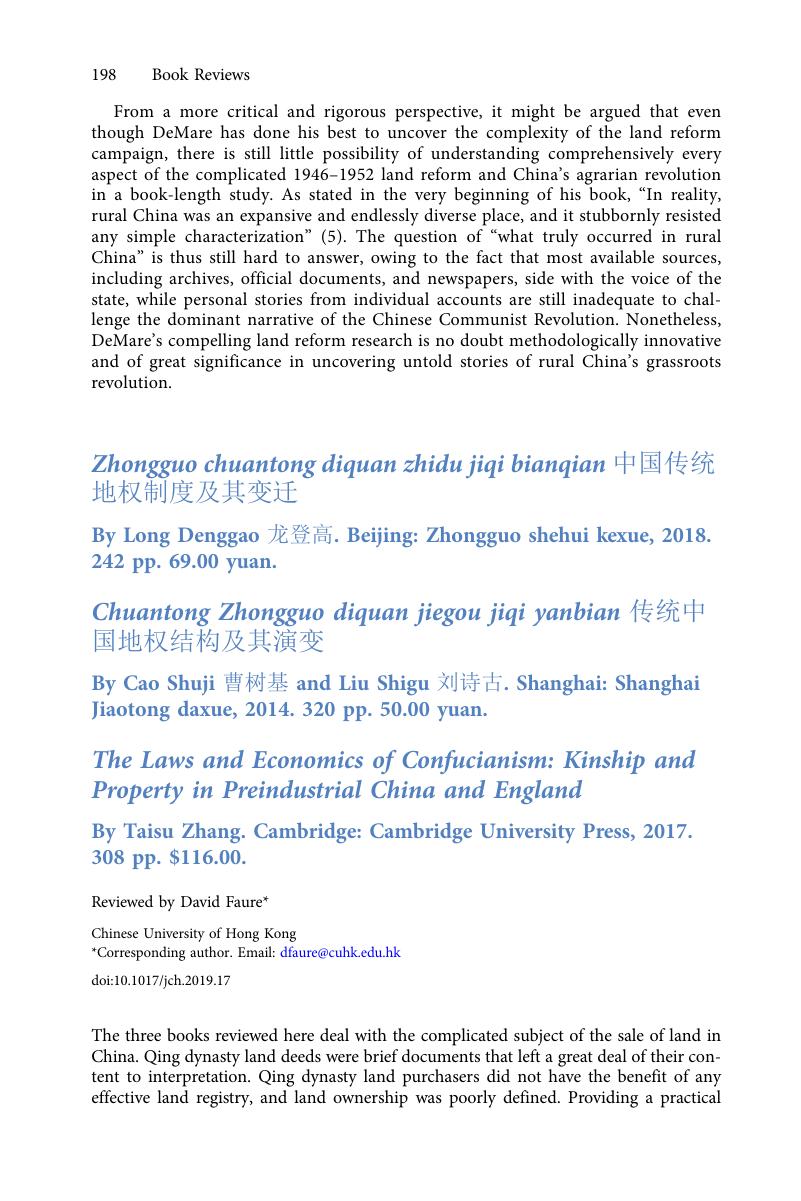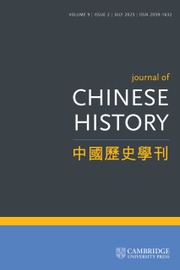No CrossRef data available.
Article contents
Zhongguo chuantong diquan zhidu jiqi bianqian 中国传统地权制度及其变迁 By Long Denggao 龙登高. Beijing: Zhongguo shehui kexue, 2018. 242 pp. 69.00 yuan. - Chuantong Zhongguo diquan jiegou jiqi yanbian 传统中国地权结构及其演变 By Cao Shuji 曹树基 and Liu Shigu 刘诗古. Shanghai: Shanghai Jiaotong daxue, 2014. 320 pp. 50.00 yuan. - The Laws and Economics of Confucianism: Kinship and Property in Preindustrial China and England By Taisu Zhang. Cambridge: Cambridge University Press, 2017. 308 pp. $116.00.
Review products
Published online by Cambridge University Press: 06 December 2019
Abstract

- Type
- Book Review
- Information
- Copyright
- Copyright © Cambridge University Press 2019
References
1 Hoang, Peter, “A Practical Treatise on Legal Ownership,” Journal of the North China Branch of the Royal Asiatic Society (1888), 118Google Scholar.
2 Long points out that Song law banned the creditor-purchaser from leasing the property to the pledger-vendor but the practice remained common in the Qing (80).
3 Wangling, Gao 高王凌, Zudian guanxi xinlun – dizhu, nongmin he dizu 租佃关系新论 – 地主、农民和地租 (Shanghai: Shanghai shudian, 2005), 213–17Google Scholar.
4 Huang, Philip C.C., The Peasant Economy and Social Change in North China (Stanford: Stanford University Press, 1985), 174–77Google Scholar.
5 Myers, Ramon H., The Chinese Peasant Economy: Agricultural Development in Hopei and Shantung, 1890–1948 (Cambridge: Harvard University Press, 1970), 82–84Google Scholar.
6 Bianshi zongpu, Wuxi: Jingsi tang 经笥堂 1874, 1/1a.
7 Wanying, Wang 王万盈, Qingdai Ningbo qiyue wenshu jijiao 清代宁波契约文书辑校 (Tianjin: Tianjin guji, 2008), 56Google Scholar.
8 Wang Wanying, Qingdai Ningbo qiyue wenshu jijiao, 110–11. I am ignoring the numbering inconsistency of one of the three plots in the two deeds.
9 Wang Wanying, Qingdai Ningbo qiyue wenshu jijiao, 前言 qianyan 5.
10 Zhang broadens his understanding of dian to cover “land conveyances used as collateral for large loans” (38). By that understanding, land sold under “permanent sale” could have been a form of dian, but, even then, it does not follow that all such sale must have been.
11 Wangzhong, Ni 倪望重, Zhuji yumin jiyao 诸暨谕民纪要 1897, in Yifan, Yang 杨一凡 and Lizhi, Xu 徐立志eds. Lidai panli pandu 历代判例判牍 (Beijing: Zhongguo shehui kexue, 2005),10: 442–43Google Scholar.


